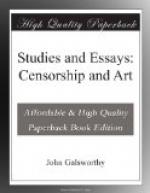If, then, the Censorship of Plays be just, beneficent, and based on a well-considered principle, we must rightly inquire what good and logical reason there is for the absence of Censorship in other departments of the national life. If Censorship of the Drama be in the real interests of the people, or at all events in what the Censor for the time being conceives to be their interest—then Censorships of Art, Literature, Religion, Science, and Politics are in the interests of the people, unless it can be proved that there exists essential difference between the Drama and these other branches of the public being. Let us consider whether there is any such essential difference.
It is fact, beyond dispute, that every year numbers of books appear which strain the average reader’s intelligence and sensibilities to an unendurable extent; books whose speculations are totally unsuited to normal thinking powers; books which contain views of morality divergent from the customary, and discussions of themes unsuited to the young person; books which, in fine, provide the greater Public with no pleasure whatsoever, and, either by harrowing their feelings or offending their good taste, cause them real pain.
It is true that, precisely as in the case of Plays, the Public are protected by a vigilant and critical Press from works of this description; that, further, they are protected by the commercial instinct of the Libraries, who will not stock an article which may offend their customers—just as, in the case of Plays, the Public are protected by the common-sense of theatrical Managers; that, finally, they are protected by the Police and the Common Law of the land. But despite all these protections, it is no uncommon thing for an average citizen to purchase one of these disturbing or dubious books. Has he, on discovering its true nature, the right to call on the bookseller to refund its value? He has not. And thus he runs a danger obviated in the case of the Drama which has the protection of a prudential Censorship. For this reason alone, how much better, then, that there should exist a paternal authority (some, no doubt, will call it grand-maternal—but sneers must not be confounded with argument) to suppress these books before appearance, and safeguard us from the danger of buying and possibly reading undesirable or painful literature!
A specious reason, however, is advanced for exempting Literature from the Censorship accorded to Plays. He—it is said—who attends the performance of a play, attends it in public, where his feelings may be harrowed and his taste offended, cheek by jowl with boys, or women of all ages; it may even chance that he has taken to this entertainment his wife, or the young persons of his household. He—on the other hand—who reads a book, reads it in privacy. True; but the wielder of this argument has clasped his fingers round a two-edged blade. The very fact that the book has no mixed




